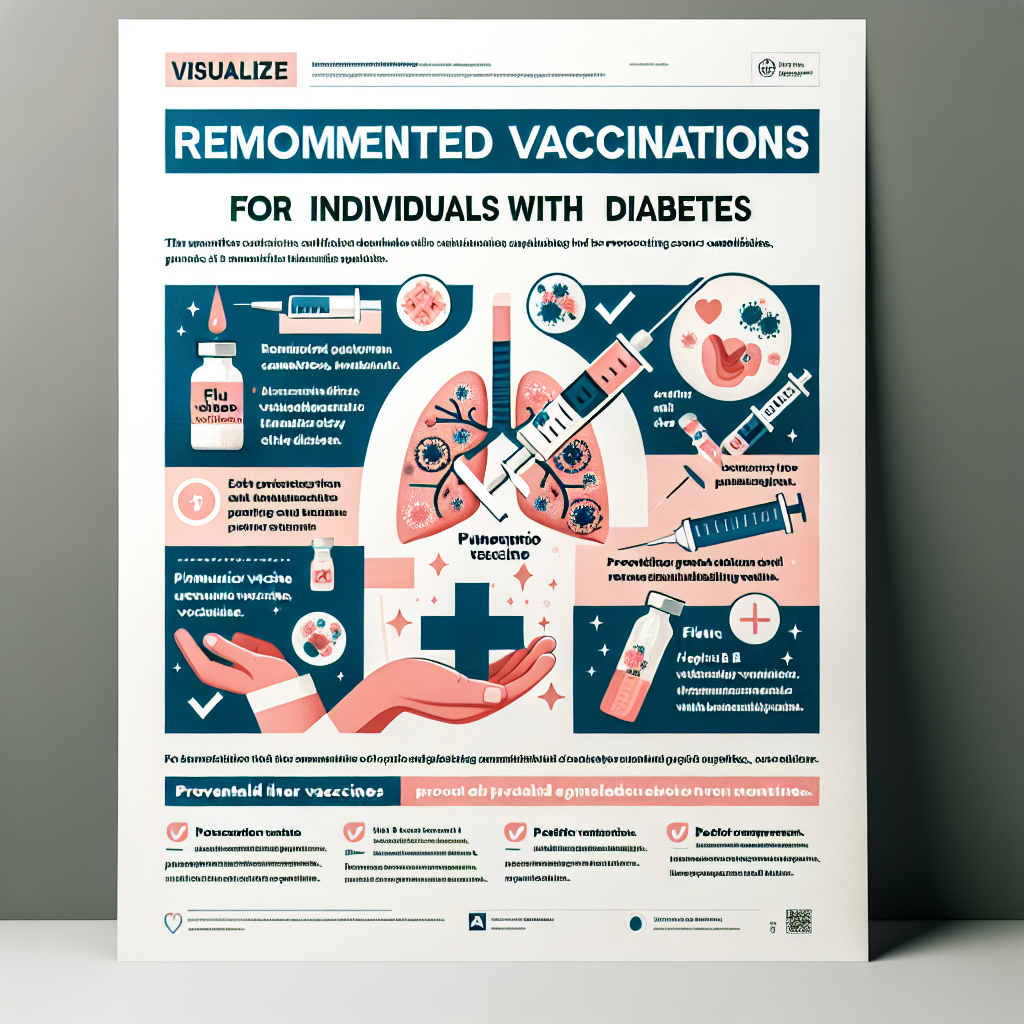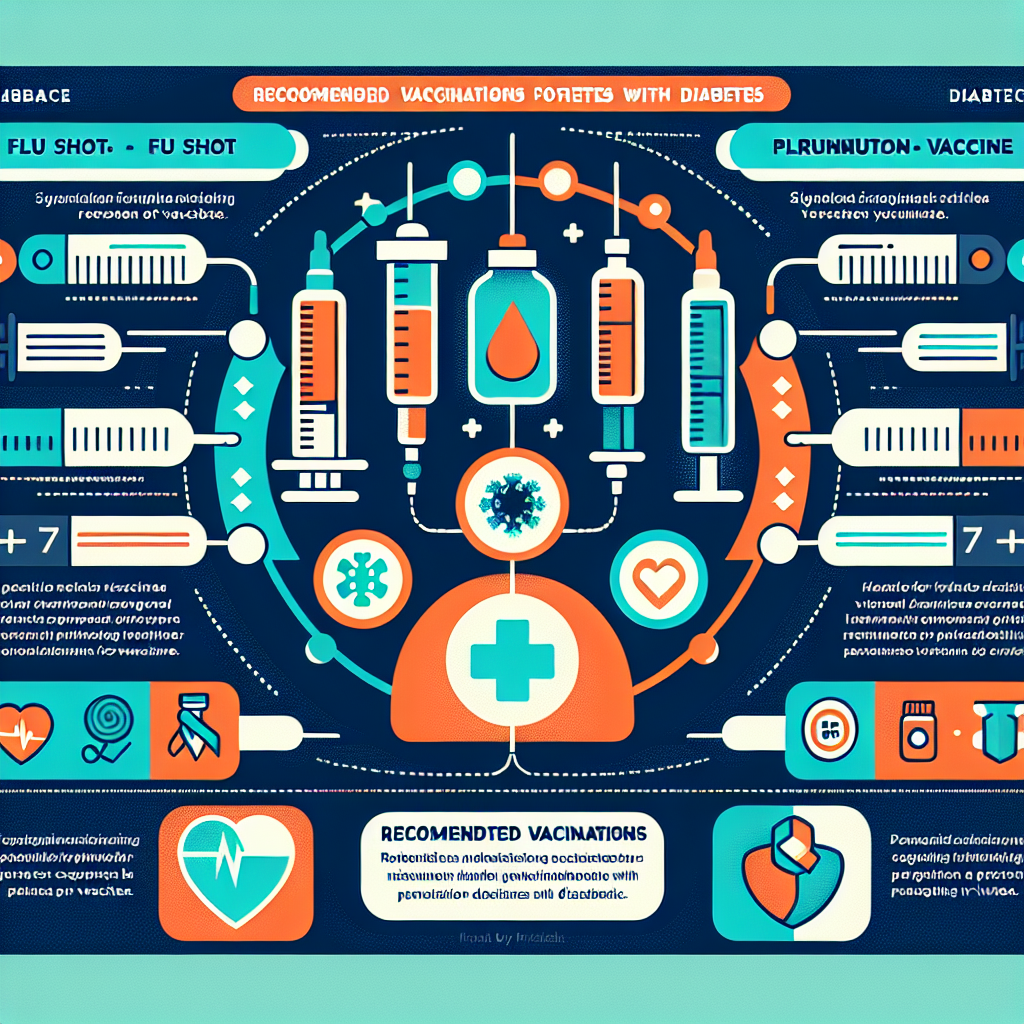Having diabetes means taking extra precautions when it comes to your health. That includes making sure you have the necessary vaccinations to protect yourself. In this article, you will discover which vaccinations are highly recommended for individuals living with diabetes. Ensuring you are up to date with these vaccinations can significantly reduce your risk of contracting preventable diseases and help you maintain a healthy and vibrant life.
Influenza Vaccine
Importance of Influenza Vaccination for People with Diabetes
As someone with diabetes, it is crucial that you prioritize getting the influenza vaccine each year. Influenza, commonly known as the flu, can lead to severe complications for individuals with diabetes. When you have diabetes, your immune system is already compromised, making it harder for your body to fight off infections. The flu can further weaken your immune system and increase the risk of developing serious complications such as pneumonia or respiratory distress. By getting vaccinated against the flu, you significantly reduce your chances of falling ill and experiencing these potentially life-threatening complications.
Guidelines for Influenza Vaccination
The guidelines for influenza vaccination recommend that everyone with diabetes, regardless of their age, should receive an annual flu shot. It is generally recommended to get vaccinated before the flu season begins, which is typically in the fall. However, if you haven’t gotten vaccinated yet, it’s never too late to do so. You can receive the flu vaccine at your doctor’s office, local clinics, or pharmacies. Remember to inform the healthcare professional about your diabetes so they can provide any necessary precautions or advice.
Benefits of Influenza Vaccination
The benefits of getting the influenza vaccine are numerous. Firstly, the vaccine can help protect you from contracting the flu, which can be particularly dangerous for individuals with diabetes. Secondly, even if you do contract the flu after being vaccinated, the severity of the illness is often reduced. This means that you are less likely to experience severe complications and hospitalization. Additionally, by getting vaccinated, you contribute to community immunity, also known as herd immunity, which helps protect vulnerable individuals who may not be able to receive the vaccine.
Pneumococcal Vaccine
Importance of Pneumococcal Vaccination for People with Diabetes
Another important vaccination for individuals with diabetes is the pneumococcal vaccine. Pneumococcal disease is caused by the bacteria Streptococcus pneumoniae and can lead to serious infections such as pneumonia, meningitis, and bloodstream infections. People with diabetes are at a higher risk of developing complications from pneumococcal disease. By getting vaccinated against pneumococcal disease, you can significantly reduce the risk of developing these serious infections.
Guidelines for Pneumococcal Vaccination
The guidelines for pneumococcal vaccination recommend that all adults with diabetes should receive the pneumococcal vaccine. There are two types of pneumococcal vaccines available: Pneumococcal conjugate vaccine (PCV13) and Pneumococcal polysaccharide vaccine (PPSV23). The PCV13 vaccine is recommended for adults aged 19 to 64 years, while the PPSV23 vaccine is recommended for adults aged 65 years and older. It is important to consult with your healthcare provider to determine the most appropriate vaccine for you based on your age and overall health.
Benefits of Pneumococcal Vaccination
Getting vaccinated against pneumococcal disease offers several benefits. Firstly, it helps protect you from developing serious infections such as pneumonia, meningitis, and bloodstream infections. Secondly, the vaccine can reduce the severity of the illness if you do contract pneumococcal disease. It can also lower the risk of hospitalization and potential complications that can arise from these infections. Overall, getting vaccinated against pneumococcal disease is crucial for maintaining optimal health and preventing potentially life-threatening infections.

Hepatitis B Vaccine
Importance of Hepatitis B Vaccination for People with Diabetes
Hepatitis B is a viral infection that affects the liver and can cause chronic liver disease. People with diabetes are more prone to developing complications from hepatitis B. The hepatitis B vaccine is vital for individuals with diabetes as it can protect against the transmission of the virus through infected blood or body fluids. By receiving the hepatitis B vaccine, you can significantly reduce the risk of developing chronic liver disease and other complications associated with hepatitis B.
Guidelines for Hepatitis B Vaccination
The guidelines for hepatitis B vaccination recommend that all individuals with diabetes should receive the hepatitis B vaccine. The vaccine is typically given as a series of three or four shots over a span of six months. It is important to talk to your healthcare provider about the recommended schedule based on your specific needs and health condition. They can also inform you about any additional precautions or considerations to take into account.
Benefits of Hepatitis B Vaccination
The benefits of hepatitis B vaccination for individuals with diabetes are significant. By getting vaccinated, you can protect yourself from the risk of developing chronic liver disease, liver cancer, or other complications associated with hepatitis B. It also helps prevent the transmission of the virus to others, ensuring the safety and well-being of those around you. Overall, the hepatitis B vaccine is an essential tool in safeguarding your liver health and minimizing the potential consequences of a hepatitis B infection.
Hepatitis A Vaccine
Importance of Hepatitis A Vaccination for People with Diabetes
Hepatitis A is another viral infection that affects the liver and can cause acute illness. People with diabetes are more susceptible to severe complications from hepatitis A. The hepatitis A vaccine plays a crucial role in protecting individuals with diabetes from contracting the virus and potentially experiencing serious health consequences.
Guidelines for Hepatitis A Vaccination
The guidelines for hepatitis A vaccination recommend that individuals with diabetes should receive the hepatitis A vaccine to reduce the risk of infection and associated complications. The vaccine is given as a series of two shots, usually six months apart. It is recommended to discuss the vaccine schedule with your healthcare provider and ensure that all necessary precautions and considerations are addressed.
Benefits of Hepatitis A Vaccination
Receiving the hepatitis A vaccine offers numerous benefits for individuals with diabetes. By getting vaccinated, you significantly reduce the risk of acquiring the virus and developing acute hepatitis A infection. This helps protect your liver health and prevents potentially severe complications. Additionally, the vaccine helps prevent the spread of the virus to others, contributing to the overall public health.

Tetanus, Diphtheria, and Pertussis (Tdap) Vaccine
Importance of Tdap Vaccination for People with Diabetes
The Tdap vaccine is a combination vaccine that protects against three potentially serious bacterial infections: tetanus, diphtheria, and pertussis (whooping cough). While diabetes does not directly increase the risk of these infections, it is essential for individuals with diabetes to receive the Tdap vaccine to maintain their overall health and well-being.
Guidelines for Tdap Vaccination
The guidelines for Tdap vaccination recommend that all adults, including those with diabetes, should receive a one-time dose of Tdap vaccine to protect against tetanus, diphtheria, and pertussis. Additionally, it is essential to receive a booster shot every ten years to maintain adequate protection. It is crucial to consult with your healthcare provider to ensure you are up to date with your Tdap vaccination status.
Benefits of Tdap Vaccination
Getting vaccinated against tetanus, diphtheria, and pertussis offers several benefits for individuals with diabetes. Firstly, it protects against tetanus, a potentially life-threatening bacterial infection that can enter the body through cuts or wounds. Secondly, it helps prevent diphtheria, a bacterial infection that can affect the respiratory system and cause severe complications. Lastly, it safeguards against pertussis, a highly contagious respiratory infection that can be particularly dangerous for individuals with diabetes. By receiving the Tdap vaccine, you ensure your immune system is prepared to combat these bacterial infections, reducing the risk of falling ill and experiencing related complications.
Varicella (Chickenpox) Vaccine
Importance of Varicella Vaccination for People with Diabetes
Varicella, commonly known as chickenpox, is a highly contagious viral infection that causes an itchy rash and fever. People with diabetes are at an increased risk of developing severe complications from chickenpox. Vaccination against varicella is crucial for individuals with diabetes to protect themselves from the virus and its potential complications.
Guidelines for Varicella Vaccination
The guidelines for varicella vaccination recommend that individuals with diabetes should receive the varicella vaccine, typically given as two doses. If you have already had chickenpox in the past, you may be considered immune and may not require vaccination. However, it is essential to consult with your healthcare provider to determine the most appropriate course of action based on your specific circumstances.
Benefits of Varicella Vaccination
By getting vaccinated against varicella, you significantly reduce the risk of contracting chickenpox, a highly contagious infection. This helps protect individuals with diabetes from experiencing the associated complications, such as bacterial skin infections, pneumonia, or encephalitis. The varicella vaccine not only safeguards your health but also contributes to the prevention of spreading the virus to others who may be more vulnerable.

Human Papillomavirus (HPV) Vaccine
Importance of HPV Vaccination for People with Diabetes
Human papillomavirus (HPV) is a common sexually transmitted infection that can lead to various forms of cancer, including cervical, vulvar, vaginal, penile, anal, and throat cancer. Individuals with diabetes are not more susceptible to HPV, but it is essential for their overall health and well-being to receive the HPV vaccine to prevent these potentially life-threatening cancers.
Guidelines for HPV Vaccination
The guidelines for HPV vaccination recommend that both males and females should receive the HPV vaccine. The vaccine is typically administered as a two-dose or three-dose series, depending on age and risk factors. It is crucial to discuss the appropriate vaccine schedule with your healthcare provider to ensure optimal protection.
Benefits of HPV Vaccination
Getting vaccinated against HPV offers significant benefits for individuals with diabetes. Firstly, it helps prevent HPV infection, reducing the risk of developing HPV-associated cancers. Secondly, by protecting yourself against HPV, you indirectly protect your sexual partner(s) from contracting the infection. The HPV vaccine is a powerful tool in cancer prevention, and it is crucial for individuals with diabetes to take advantage of this preventive measure.
Meningococcal Vaccine
Importance of Meningococcal Vaccination for People with Diabetes
Meningococcal disease is a severe bacterial infection that can lead to meningitis or bloodstream infections. People with diabetes are at an increased risk of developing meningococcal disease. Given the potential complications, it is crucial for individuals with diabetes to receive the meningococcal vaccine to protect against this bacterial infection.
Guidelines for Meningococcal Vaccination
The guidelines for meningococcal vaccination recommend that individuals with diabetes should receive the meningococcal vaccine, specifically the meningococcal conjugate vaccine (MCV4). There are different types of MCV4 vaccines available, and your healthcare provider can determine the most appropriate one for you based on your age and specific needs.
Benefits of Meningococcal Vaccination
By getting vaccinated against meningococcal disease, you significantly reduce the risk of developing meningitis or bloodstream infections caused by the Neisseria meningitidis bacteria. Meningococcal disease can progress rapidly and have serious consequences, making the vaccine an essential preventive measure. Protecting yourself through vaccination helps safeguard your health and prevents potentially life-threatening complications.

Measles, Mumps, Rubella (MMR) Vaccine
Importance of MMR Vaccination for People with Diabetes
The MMR vaccine protects against three viral infections: measles, mumps, and rubella. While individuals with diabetes are not at a higher risk of contracting these infections, it is crucial for them to receive the MMR vaccine to ensure their overall health and well-being.
Guidelines for MMR Vaccination
The guidelines for MMR vaccination recommend that all adults, including individuals with diabetes, should receive the MMR vaccine if they have not been previously vaccinated or have not had the infections in the past. It is essential to consult with your healthcare provider to determine your MMR vaccination status and discuss any potential risks or considerations.
Benefits of MMR Vaccination
The MMR vaccine provides several benefits for individuals with diabetes. Firstly, it protects against measles, a highly contagious viral infection that can cause severe complications such as pneumonia or encephalitis. Secondly, it helps prevent mumps, a viral infection that primarily affects the salivary glands and can lead to complications such as meningitis or inflammation of the testicles or ovaries. Lastly, it safeguards against rubella, a viral infection that can cause birth defects if contracted during pregnancy. By receiving the MMR vaccine, you ensure protection against these viruses and minimize the risks of related complications.
Zoster (Shingles) Vaccine
Importance of Zoster Vaccination for People with Diabetes
Zoster, commonly known as shingles, is a viral infection that causes a painful, blistering rash. People with diabetes are more susceptible to developing complications from shingles and are at an increased risk of postherpetic neuralgia (nerve pain that persists after the rash is gone). The zoster vaccine is crucial for individuals with diabetes to prevent shingles and its potential complications.
Guidelines for Zoster Vaccination
The guidelines for zoster vaccination recommend that individuals with diabetes should receive the zoster vaccine, specifically the recombinant zoster vaccine (RZV) or the live attenuated zoster vaccine (ZVL). It is important to consult with your healthcare provider to determine the most suitable vaccine option for you based on your age and specific health considerations.
Benefits of Zoster Vaccination
By getting vaccinated against shingles, you significantly reduce the risk of developing this painful and potentially debilitating condition. The zoster vaccine not only lowers the chances of developing shingles but also helps reduce the severity and duration of the illness if you do happen to contract it. Additionally, it decreases the risk of postherpetic neuralgia, which can have a long-term impact on your quality of life. Protecting yourself through zoster vaccination is a crucial step in maintaining your health and well-being.


